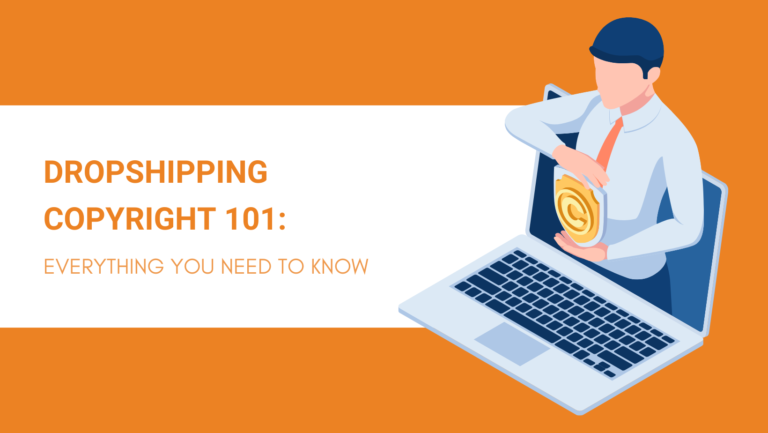Dropshipping has made a significant impact in the e-commerce world, offering you the chance to sell products without holding any inventory.
However, as this model thrives, it becomes crucial to understand and adhere to copyright and trademark laws. Neglecting these regulations can not only hurt your brand but also lead to serious legal ramifications.
We’ll journey through the fundamental copyright considerations to keep your business on the right side of the law, addressing prevalent issues ranging from misuse of images and texts to selling counterfeit products.
Remember, legality isn’t a mere formality; it is a cornerstone of your business’s integrity. This article will help you avoid common pitfalls and ensure that your dropshipping venture stands on solid legal ground.

Understanding Copyright and Trademark Laws in Dropshipping
When you’re diving into the world of dropshipping, it’s crucial to understand how copyright and trademark laws apply to your business.
These laws protect intellectual property rights, ensuring creators and branded companies can control and profit from their own work.
Copyright refers to the legal right that grants the creator of original work exclusive rights to its use and distribution, usually for a limited time, to enable the creator to receive compensation for their intellectual labor.
Copyright covers literary and artistic works such as novels, poems, plays, films, music, and software.
Trademark, on the other hand, is concerned with protecting a company’s brand identity. This includes logos, slogans, and brand names that distinguish goods or services offered by one entity from those of another.
In dropshipping, respecting these laws means you cannot use another company’s copyrighted images or replicate their trademarked brand identity to sell products.
For example, using a sports team logo without permission is a direct infringement of trademark laws.
Notice that certain copyright infringement actions can result in hefty fines ranging from $750 to $30,000.
Additionally, complying with tax laws, licensing, and consumer protection regulations within your dropshipping business is also a legal requirement.
Common Copyright Issues in Dropshipping
1. Copying Texts, Videos and Images
When you’re setting up your dropshipping store, it’s tempting to use the texts, videos, and images provided by your supplier. However, simply copying these elements without permission is not only unethical but can lead to legal complications.
Why is it illegal? Copyright laws protect the original creators of content from having their work used without consent. When you take product descriptions, images, or videos from another site, you violate these laws, potentially leading to lawsuits.

Creating original content not only keeps you in the safe zone but also sets your store apart from competitors. Furthermore, it improves your SEO and engages customers better.
Here are some steps to protect your business:
- Get Permission: Before using any material, get explicit permission from the copyright holder.
- Create Your Own: Invest in creating or sourcing your own product images and copy. It may save you legal trouble and enhance your brand’s reputation.
2. Altering Branded Products Without Permission
Respecting intellectual property rights is crucial when you’re involved in drop shipping, especially when it comes to branded products.
Modifying these products without permission from the copyright or trademark owners bypasses their legal rights and can result in severe consequences.
Altering branded merchandise in any form and selling them as original is a direct infringement of copyrights. Remember, branded products are legally protected; therefore, you’re at risk of facing lawsuits.
- Financial Risks: Copyright infringement can lead to heavy fines, with penalties ranging from $200 to $150,000 for each work infringed.
- Reputation Damage: Your business’s reputation may suffer as word spreads about the infringement, impacting customer trust and future sales.
Here are some potential legal actions that you may face when involved in infringement of copyrights.
- Cease and desist letters demanding you to stop selling the altered products.
- Lawsuits seeking financial compensation for damages.
- Court orders preventing further sales and distribution of counterfeit goods.
Actually, maintaining the integrity of the products you sell preserves the trust built by the brand. And it’s important to understand that consumers rely on the consistency and quality associated with a brand name.
To be on the safe side, always seek formal permission or a licensing agreement before making changes to any branded items. This ensures you can legally sell these goods and protects both your business and the brand’s integrity.

When running a dropshipping business, being transparent with your customers about your status as a reseller is important.
It’s tempting to want to increase credibility by claiming to be an authorized reseller; however, without official permission from the brand, this could land you in serious legal trouble.
Firstly, understand that dropshipping is legal, but how you represent your business plays a big part in maintaining that legality.
If you claim to be an authorized reseller, ensure that you indeed have authorization. Otherwise, you are misrepresenting your business, which is not only unethical but could also lead to legal actions from the brand.
As a reseller, you can sell branded products provided you source them through legitimate channels. But claiming to be an authorized seller without official documentation poses a risk.
Brands take their reputation seriously, and if you sell their products under false pretenses, they may sue you for damages. Knowing the importance of this, work with reputable sellers to avoid such risks.
Here’s why proper authorization is critical:
- Protects you from legal consequences.
- Builds trust with customers.
- Upholds the integrity of the brands you’re selling.
If you want to avoid lawsuits and maintain a sustainable dropshipping business, it’s imperative to either obtain official authorization or clear up that you are not directly affiliated with the brand.
Legal Consequences of Copyright Infringement
Facing a lawsuit for copyright infringement can be a serious matter for your dropshipping business. When you sell products with copyrighted material without permission, you’re at risk of legal action.
If sued, not only could it lead to costly court battles, but you also might owe substantial fines.
Courts assess damages on a case-by-case basis, but if found liable, the cost could range from $200 to $150,000 for each work infringed. In extreme cases, infringers could face criminal charges in extreme cases, potentially resulting in prison time.

Your business’s reputation can suffer significantly, too. When customers discover they’ve purchased counterfeit items, trust erodes, often leading to lost sales and a damaged brand image.
This social fallout can sometimes be more detrimental than the fines themselves.
So taking proactive steps to ensure all your products are legitimate can save you from the headache of legal battles and maintain the integrity of your dropshipping business.
How to Avoid Copyright Infringement
Employ the following strategies, and you’ll be well on your way to running a legal and ethical dropshipping business.
1. Avoid Intellectual Theft
When you embark on your dropshipping journey, a critical step is to respect the original work of others. Intellectual theft, simply put, is using someone else’s creative work without permission. Here are a few ways to prevent this.
Understand Copyright Laws
Familiarize yourself with copyright laws, which protect creative work from being used without consent. Remember, photos, logos, and unique product designs are typically copyrighted material.
- Do Your Research
Begin with thorough product research. Look for products that aren’t protected by copyrights or are available for generic use.
- Create Original Content
Craft your own product descriptions instead of copying from competitors. Utilize tools like Grammarly to help you write original content that is both clear and error-free.
- Use Licensed Images or Create Your Own
For product images, opt for stock photos from legitimate sources like Shutterstock or take your own photographs.
Employ Content Verification Tools
To ensure you aren’t accidentally infringing on someone’s intellectual property, use tools like Copyscape to check the originality of your web content.
By integrating these practices into your business strategy, you create a reputable brand that’s built on trust and originality. This not only establishes your credibility but also sets the foundation for a sustainable dropshipping business.
Remember, investing time in creating unique content pays off by differentiating your store and avoiding legal pitfalls.
2. Find Trusted Suppliers

Finding trusted suppliers is a crucial step in setting up a dropshipping business. By partnering with reputable suppliers, you ensure not only the quality and authenticity of your products but also comply with legal standards.
This is essential for the legality and success of your dropshipping enterprise.
| Key Consideration | What You Can Do |
| Legal Compliance | Verify that suppliers adhere to copyright laws. |
| Licensing Needs | Confirm no additional licenses are required for reselling. |
To protect your dropshipping business from copyright infringement:
- Check Supplier Track Records: Look for suppliers with positive reviews and a strong performance history. Platforms like DSers help you compare suppliers on several factors.
- Product Authenticity: Confirm the legitimacy of the products offered. Authentic products minimize the risk of infringing on intellectual property rights.
- Request Samples: If possible, get test samples to verify product quality.
By taking these steps, you can secure a reliable supply chain that supports your brand integrity and trustworthiness.
3. Make Yourself Trustworthy
Building trust in dropshipping is key to ensuring that your customers feel confident purchasing from your store. Establishing a trustworthy brand goes a long way in mitigating the risk of copyright issues. Here’s how you can build trust:
Formalize Your Business
First, set up a Limited Liability Company (LLC), which provides legal protection and enhances credibility. Obtaining a business license also demonstrates your commitment to legitimacy.
- LLC Formation: This gives your business a formal structure and personal asset protection.
- Business License: Having one shows that you comply with local laws and regulations.
Be Transparent
Customers appreciate when you are honest about your products. Clearly display product information, and avoid making false claims about what you sell. Transparency builds consumer trust and loyalty.
Come Up with Own Product Descriptions
Create unique product listings without infringing on others’ copyrights. This will enhance your brand’s uniqueness and show respect for intellectual property.

Provide a Responsive Customer Service
Provide excellent customer service. Responsive and helpful support can lead to a positive reputation and decrease the likelihood of complaints.
4. Don’t Sell Counterfeit Products
When you dropship, ensure the products you sell are authentic and sourced from legitimate suppliers.
Identify Genuine Products
- Look for official certifications or brand markings.
- Verify the supplier’s authenticity; reputable platforms often provide a way to check.
Understand the Costs
Selling knock-offs might seem profitable, but the legal ramifications can be severe:
- Fines: Legal action can result in hefty penalties.
- Business Closure: Your store can be shut down.
Protect Your Business
- Establish a direct line of communication with your suppliers.
- Demand proof of authenticity for branded items.
Know the Signs of Counterfeit
- Prices that are too good to be true.
- Mismatched logos or branding inconsistencies.
- Lack of warranty or support.
It’s not just about legality; it’s about ethics. Selling counterfeit items deceives your customers and undermines trust. It’s your responsibility to ensure that every product in your store is legitimate.
5. Get Your Business Insured
When you’re running a dropshipping business, getting business insurance is a smart step to protect yourself. It can shield you from losing money because of legal troubles.
Suppose you’re selling a product, and it turns out to infringe on someone else’s copyright. If you have the right insurance, it can cover the costs that come with legal claims.
There are different kinds of insurance policies for e-commerce businesses:
- General Liability Insurance: This covers injuries or property damage caused by your products.
- Professional Indemnity Insurance: If you give advice or services, this can protect you against claims of negligence.
- Product Liability Insurance: Specifically for products sold, if they cause harm.
If you’ve formed an LLC (Limited Liability Company), insurance adds another layer of protection on top of the limited liability status. While an LLC separates your personal assets from your business, insurance helps protect your business’s assets.

When you apply for a business license, having insurance can be beneficial, especially if the licensing authority requires proof of insurance. Always remember to check the laws in your area, as requirements can vary.
Here are some quick facts:
- Insurance can cover legal fees and settlements.
- It’s important for both product-based and service-based e-commerce operations.
- An LLC doesn’t replace the need for insurance; they work together for better protection.
Taking this step not only safeguards your business but also signals professionalism to your customers and partners. Consult with an insurance agent who understands e-commerce to find the best coverage for your specific needs.
FAQs about Dropshipping Copyright
Understanding the legal landscape and requirements of dropshipping is crucial for running a successful and compliant business.
These FAQs provide concise, accurate answers to some of the common questions around the legality and operational aspects of dropshipping.
Is Dropshipping Legal?
Yes, dropshipping is a legal business model. However, to operate legally, you must comply with all relevant trade laws and regulations.
This includes respecting copyright, trademark, and other intellectual property rights. For information about e-commerce laws, the Federal Trade Commission offers valuable guidance.
Do I Need Any Licenses for Dropshipping?
Running a dropshipping business requires you to adhere to the same legal formalities as any other business, which might include obtaining business licenses or permits.
The requirements vary depending on your location, the products you sell, and your business size. You can find detailed information on the U.S. Small Business Administration website.
What to Do If I Face Copyright Issues as a Dropshipper?
If you encounter copyright issues, it’s important to act promptly. Consult with a qualified attorney to understand your legal position.
You should also comply with any cease-and-desist letters by removing the alleged infringing products from sale. Platforms like Avvo can connect you with lawyers and provide additional advice.
Is It Necessary to Dropship from Accredited Distributors?
Partnering with accredited distributors is not mandatory, but it can prevent legal issues related to copyright infringement and authenticity.
Accredited suppliers typically guarantee that your products are legitimate, reducing the risk of copyright complaints.
Industry standards and e-commerce best practices suggest that working with reputable distributors is a safer, more reliable way to source products.
Wrapping Up: Staying Compliant with Copyright Laws in Dropshipping
Just like any other business, dropshipping also comes with its fair share of legal complications.
Most people may not pay much consideration to it, but you’re just one lawsuit away from bankruptcy.
This is why don’t take such risks, to begin with, and eliminate all possibilities of dealing with copyright issues by following our tips above.
If you’re looking for reliable suppliers to help you avoid copyright violations then NicheDropshipping has got you covered.
We can help you source your desired products from reputable suppliers and even assist you in private labeling them so you can build your own brand.
Request a sourcing quote and confidently embark on your dropshipping journey.


I am wanting to start a dropshipping business with merchandise with motorsport cars and drivers on it e.g. shirts with a picture of a race teams car on it. The photos I would use on the merchandise would be bought from a photographer on websites like alarmy. If I buy the rights to those photos from the photographer, is that all I need? Or do I have to get the permission and rights from the race team who’s car is in the photo?
Thanks.